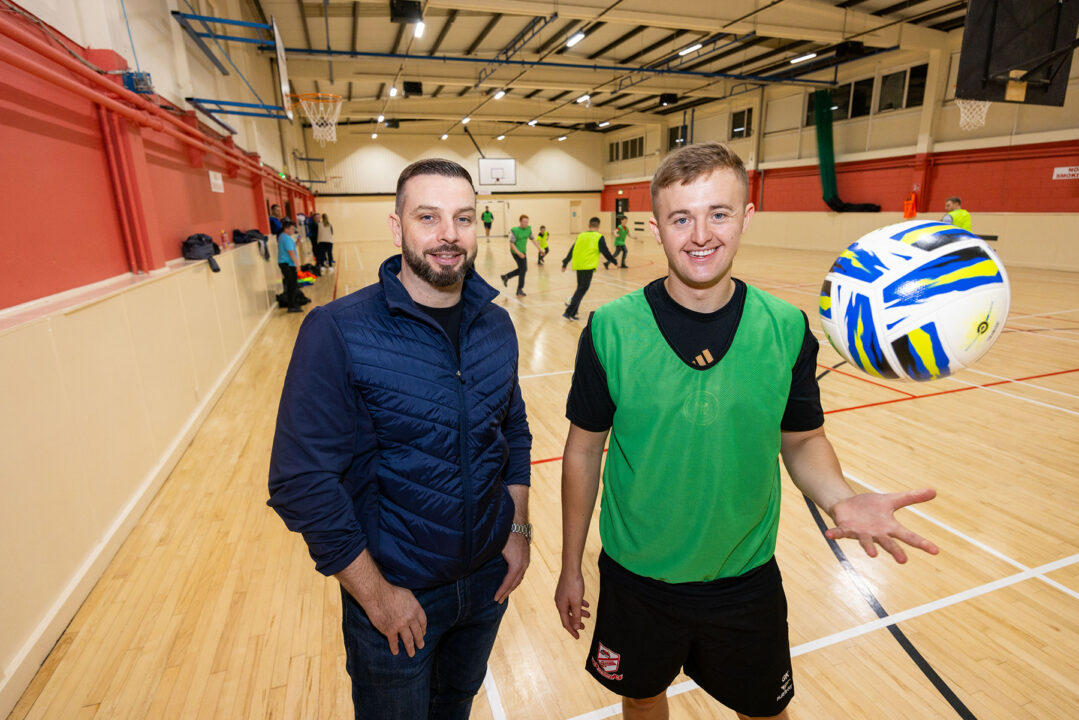The power of sport in diverting young people away from crime, drugs and anti-social behaviour has long been championed.
But in the north Dublin suburb of Darndale, the involvement of community policing in a late night soccer league has allowed local youth to view Gardaí in a whole new light.
So much so that one Community Garda, Gerhard Keller, based at the local Coolock Station, has progressed from coaching and refereeing at the weekly An Garda Síochána/FAI/Dublin City Council/Late Night Soccer Leaguesto being embedded in the local club, Darndale FC, where he is taking his coaching badges.
The Late Night Leagues are a juvenile diversionary programme in areas of need in the east of the country which can attract up to 150 young footballers to Darndale’s Belcamp Building.
They aim to engage youth aged 11-18 on dark winter nights – prime time for anti-social behaviour – and encourage young people to build relationships with Gardaí who coach and referee.
“We have faced the obstacle of ‘you are a rat because you are going to play football with the Guards’ but because kids came together in such numbers, that rhetoric broke down,” said Coolock Community Garda Sergeant Chris O’Shaughnessy.
“You see a gradual shift. There can be an attitude at first because of Garda involvement. But we integrate and build relationships. Ultimately, the eagerness for competition takes over, the significance of a Garda presence fades, and the Garda becomes a person, someone to interact and have fun with. It really works.”
O’Shaughnessy says his boss, Superintendent Ronan Barry, is hugely supportive of community policing in the area, despite the sector often being the first casualty of a lack of resources.
Local outreach groups working with young people vulnerable to crime and drugs promote the Leagues among service users.
The social and economic difficulties which beset the Darndale area have been well documented over many years. In 2019, Dublin City Council assumed a central leadership role in tackling these longstanding, complex and engrained issues.
As a first step, it engaged Dr Jack Nolan, a retired Assistant Garda Commissioner, to undertake an in-depth review, engaging with stakeholders and residents. This resulted in the publication of a report, ‘Darndale – a long view of an enduring challenge.’
Recommendations of the report are being implemented under the auspices of an oversight body made up of agencies serving the area.
Since the publication of the report, Coolock-based O’Tooles GAA Club has begun nurseries in Darndale, but boxing, and primarily soccer, remain the sports of choice for local youth.
According to Keller, “as Gardaí, the Leagues allow us positive engagement while keeping kids off the streets.”
The complex issues affecting places like Darndale include an inherent negative perception of An Garda Siochana.
“While the Late Night Leagues are primarily about social inclusion for children in a disadvantaged area, it allows them engage with us a very meaningful way. There can be a reluctance because Gardaí are involved,” said O’Shaughnessy
“But I have seen, particularly through Gerhard, how sport breaks down barriers. It is as if they do not look at Gerhard as a Garda anymore. He is one of them.
“Gerhard progressing to become involved with Darndale FC, has been brilliant for us. We go to the matches, not in Garda tops, but as supporters and parents.
“The Late Night Leagues embedded Gerhard in the community. I have seen parents tug the arms of children when they see a Garda. In that context, it is a huge deal to gain this ground.
“It really is crime prevention. So many young people really adore soccer and look up to people who are successful in that world. So for us to get an opportunity to integrate and talk to them is golden. And it distracts them from getting involved in other things.
“In places like Darndale, there are individuals who want to build influence around children, who will groom them into carrying drugs and get them involved in drug debt intimidation.
“So for us to pull them away from that, even if it is only for a few hours on a Friday night, is ultimately about giving a young person the idea that they do not have to do that.
“And they are not being exposed to these people during that time. The majority of kids pulled into gangs are afraid of the people running them. There is a reluctance to say no.”
According to Keller, the breakthrough can extend through to young people’s families.
“There was a lad who gave me the long-yard stare at first. But he came to the Late Night Leagues, built some trust and suddenly he was not causing trouble at the shops anymore.
“He would wave at me and want to talk about football instead. So I got to know his parents and we chat, whereas before they would not have wanted anything to do with the Guards.
“There are no issues with him anymore, it is not all down to football, but he was shown there were other avenues.”
O’Shaughnessy says the first challenge for Guards in areas like Darndale is to integrate.
“Young Guards from rural areas on the beat in Darndale may feel like they have been dropped on another planet.
“But they have to adjust to life as it is there. That is done through community engagement and the better you are known, the less likely it is that something bad will happen to you.
“People will see you in a different context. I have actually come across kids from in the area with an interest in joining the Gardaí after interaction with community policing. That is massive. Changing attitudes is crime prevention.”
